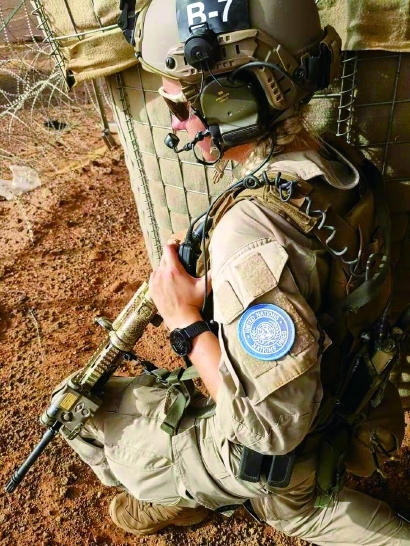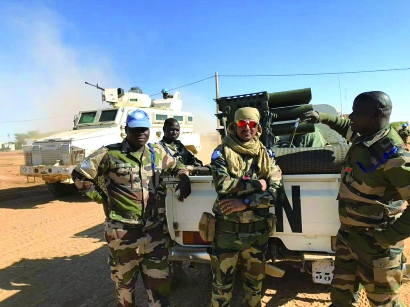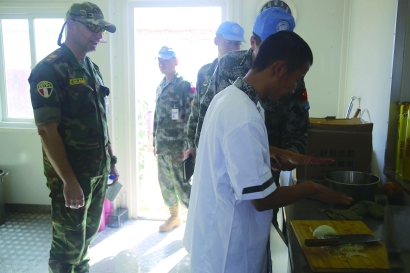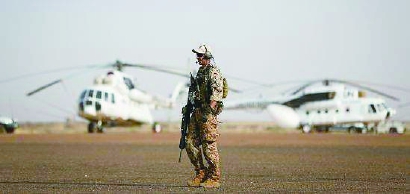By Xiang Yong, Wang Qiang, Gao Wei
As Chinese troops are carrying out more peacekeeping missions in recent years, they have learned many combat skills from exchanges with their foreign counterparts, in addition to fulfilling the responsibilities of a military from a major country. Here the 7th batch of Chinese peacekeepers to Mali will tell their stories about foreign troops.
Always ready to fight
Narrator:Major Yang Yufei, squadron commander
At 15:47, July 22, 2019, a Chinese peacekeeping contingent was building a blast wall at the hangar of Gao International Airport, when a barrage of gunshots was heard followed by a deafening boom and a rising mushroom cloud. It was the sneaking terrorists being stopped by a sentry near the airport of French troops deployed to the Operation Barkhane in Gao, and the car bomb that was set to explode within the airport was detonated in advance.
The minute the crossfire started, the French troops busy unloading goods immediately took shelter behind plane tires and the unloaded cargoes in battle formation, meanwhile the Eurocopter Tiger attack helicopter flew at a low altitude for reconnaissance. During the firefight, I came across a French female soldier in a bunker who carried a long and a short gun, eight cartridge holders, four grenades, and a radio. I met this “iron lady” again at the Peacekeepers’ Night Evening Party. She was still fully armed, saying “I’m always ready to fight out of the barracks.”
Soon afterward, we helped the French troops transport red earth at the UN mission base camp in Menaka, where about 200 soldiers from various services were fully equipped with armored vehicles, self-propelled guns, mine-clearing vehicles, and UAVs, as well as transport and armored helicopters outside the camp. The camp was laid out by function with tents, vehicles, and equipment loosely located. The tents were simply fitted with a desk, a chair, a camp bed, and a backpack. The weapons were under personal custody as the troops were always in a combat state.

The faster, the more initiative
Narrator:Captain Yan Dongri, combat staff officer
In the eyes of Chinese peacekeeping engineers in Menaka, the neighboring Nigerien peacekeepers were loosely disciplined as they were always smoking, chatting, and joking, but their response was rather impressive in emergencies. One day when I was about to take duty, information came through the intercom that two unidentified people were on the southern side of the peacekeeping Super Camp. I was just to report to superiors when I saw the Nigerien armored vehicle dashing out of the camp and catching the two terrorists that were burying mines.
The Nigerien soldiers weren’t assembled yet when the armored vehicle started. Those who are quick efficient got on first, they just threw their guns in the vehicle and then quickly climbed in, and the driver would press the gas pedal to the end without waiting as he knew a few soldiers would get in anyhow and those who have missed would run after the vehicle.
“Not many people are needed under such a circumstance. It would be enough if five or six get in,” said the Nigerien driver Oscar. “We value responsiveness very much. Usually, no less than ten soldiers would get into action within 30 seconds. It’s against physiological rules to be totally focused all day long, but the more responsive and maneuverable we are, the more initiative we have. In the battlefield, you cannot be always relaxed or tight, you gotta balance.”
Menaka is the vortex of conflicts in Mali, where the peacekeepers have to be on high alert, but the Nigerien soldiers at the Super Camp usually looked sluggish. They were lying down, sitting around, smoking, making tea, and drinking coffee, which struck the Chinese soldiers as quite peculiar.
On the morning of February 17, 2020, four Chinese peacekeepers were measuring for demarcation beside the Nigerian barracks, when suddenly a rocket shell exploded 300m away from the construction site. The Nigerien side immediately dashed into container bunkers while shouting and gesturing, and they were quickly ordered to occupy the blocking wall on the western side of the Super Camp to keep the invaders from entering the camp under the cover of the smoke.
These African soldiers didn’t seem to care much about whether they were properly dressed or whether they had carried the right equipment. Some came out in slippers or short-sleeved bullet vests, but they could always come in positions in the shortest time possible.
In May, a Nigerian motorcade was attacked by roadside bombs when patrolling in the city proper of Menaka, followed by close-range firing by terrorists, but they almost annihilated all the terrorists with only three mild injuries on their own side. They did things the fastest way, that’s their trait. They would carry a gun whether they were eating, watching a movie, or going to the toilet, so they could join the action immediately if anything went wrong.

All for real combat
Narrator: Captain Sun Jianxun, commander of the logistics squadron
I remember the day very well when Egyptian officer Isram, deputy chief of G4 (logistics division of MINUSMA eastern theater) had an inspection on the Chinese peacekeeping engineers in June 2019.
I was unprepared when he asked if we had prepared three-day’ food in the bunker, if single soldiers had access to clean water during field operations, and how we ensured food supply on the field. He also pointed out the absence of a fire exit in the cooking room. Because in my experience, only large gathering venues like halls needed fire exit, why was it necessary in a 30-sq-m cooking room? Isram said, “Everything in a peacekeeping unit should be for real combat. We must be fully prepared in drinking water, food supply, and firefighting. The cooking room is most prone to fire; a fire exit can minimize casualties.”
“Peacekeeping is also on the battleground.” This was what I learned from Isram during our first encounter. He had worked in the UN for more than three years and was very familiar with Mali. “To stay alive on the battleground, you need to remember you are on it,” he said before leaving.

Vanguard of information warfare
Narrator: Lieutenant Chen Qiang, interpreter
There was a German reconnaissance and intelligence company at the peacekeeping camp in Gao. Equipped with infantry fighting vehicles (IFV), armored vehicles, radars, UAV, and much other advanced equipment, it was tasked with providing intelligence support for MINUSMA.
During an operation led by MINUSMA and assisted by Mali government forces, the German troops cleared the way for friendly forces with UAVs every day. Their Triton and Luna could detect whether there was anyone suspicious several kilometers ahead, whether there were roadside bombs, and would take photos and send them back in time. In case of emergency, the German UAVs and IFVs always moved first to find out the situation ahead.
The German troops didn’t just collect intelligence in Gao but also covered a large area from Ansongo to Menaka. They carried out a daily patrol on the road between Ansongo and Menaka to ensure smooth logistics transportation. They also assisted friendly forces in the northern and western theaters of Mali. Every morning the buzzing sounds in the air announced the takeoff of German UAVs, and every night when I was on duty, the blinking light in the instance indicated the beginning of their night patrol.














